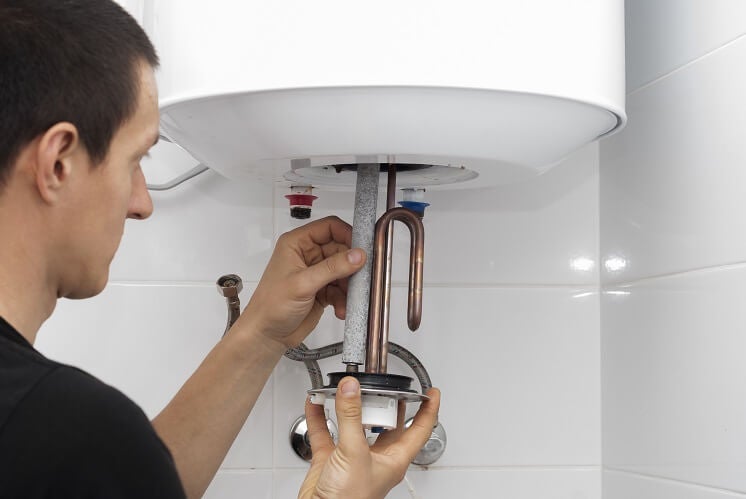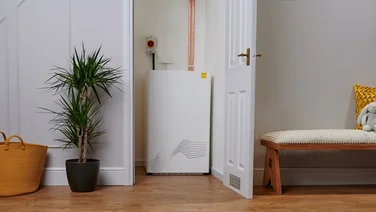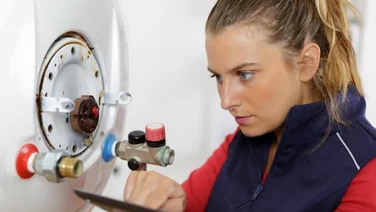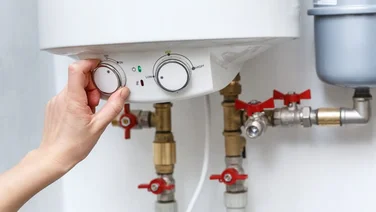✔ There are eight key signs that your boiler needs replacing
✔ Boiler replacement costs typically come to £4,000
✔ Fill in the form above to get free boiler quotes from professional installers
We’re guessing that you like having a warm, welcoming house to come home to during the winter months. So do we – but it’s easy to forget how much we actually rely on our boiler to keep us cosy at home. In fact, according to Viessmann, both heating and hot water from our boilers make up roughly 60% of what we spend on our energy bills every year (check out the cost of a new boiler).
So, since over half of your energy bills come from your boiler, knowing when it needs to be replaced should be your number one priority. Read on to find out how often your boiler needs replacing.
Think you’ve already got all the knowledge you could possibly want on boiler replacement? It sounds like it’s time for you to take the leap and get in contact with our professional boiler installers. Once you’ve filled out the form, they will be in touch with you shortly and provide you with free boiler quotes.

What’s on this page?
01 | When should I replace my boiler?
02 | New boiler vs replacement boiler
04 | How much does a boiler cost?
05 | Boiler installation costs
06 | Boilers on a budget
07 | Are you eligible for a free installment?
08 | Next steps
When should I replace my boiler?
For a species that rely so heavily on boilers for half of the seasonal year, you’d think that we would know more about them – but understanding boilers isn’t as easy as it should be.
Of course, there are the obvious signs – like having to endure an excruciatingly cold shower out of the blue – but we’ve compiled a list of the less obvious things you need to keep a watchful eye on when your boiler is on the brink of a breakdown. Find out our top eight warning signs that your boiler needs replacing below.
Before that, our guide on how much a new boiler might cost you will give you everything you’ll need to know about boiler pricing.
1. You’ve had your boiler for more than 15 years
We’re told to respect our elders, but when it comes to boilers, that saying goes out the window. The length of each boiler’s life varies, depending on a lot of different reasons, but ultimately, your boiler should last up to 15 years. If your boiler manages to make it that long, it’s likely that after that point, it won’t be of much use to you.
So if your boiler is approaching its twilight years, then you might want to think about investing in a replacement, despite how much it might pain you to fork out that much money.
Arranging annual service checks will also maintain the wellbeing of your boiler, which will consequently increase the likelihood of it having a long and healthy life – maybe even making it to the big 15.
Think of it like owning a car: to maintain our car and ensure it doesn’t have any malfunctions, we get an MOT, which will prevent any unwanted breakdowns. So, to avoid any nasty, unwelcome surprises this winter, remember to get your boiler serviced.
2. Your energy bills are increasing
Are your energy bills making you nervous, gradually creeping up each month? If so, it’s likely that your boiler needs replacing. A boiler’s efficiency will usually decrease as it gets older, leading to more expensive energy bills.
Rather than panicking and scrapping your boiler straight away, start by checking its efficiency rating. According to British Gas, A-rated boilers operate at more than 90% efficiency, while G-rated models run at 70% or less. So, if your boiler is on a lower rating, it’s time to put some money aside for a replacement – before your energy bills take it all.
3. The blue flame in your boiler has turned yellow
A healthy boiler should burn brightly with a blue flame. If your boiler’s flame is yellow, then you must call an engineer immediately so they can assess the seriousness of the situation.
The reason this is taken so seriously is because a yellow flame could suggest some sort of malfunction involving the carbon monoxide in your boiler. As carbon monoxide is odourless, it can be hard to distinguish, but it’s vital that it is spotted right away – so keep an eye out for that yellow flame.
4. Your boiler is leaking
A leak doesn’t always mean it’s time to ditch your boiler and run – it can simply mean that there’s some sort of issue with an internal component, such as a seal or valve. In this case, it’s time to call an engineer out, before it leads to other issues – such as rust and corrosion, or structural damage to your home – which you’ll definitely want to avoid.
If leaks are becoming increasingly common, it’s a sign that your boiler is not the young whipper-snapper that it used to be, and needs to be replaced.
Above all, having a leak in your boiler will mean that your heating will be inefficient, leaving you waiting impatiently for the radiators to work their magic.
5. Your radiators take longer to heat up
This is not to say that every time you’re waiting for the heat to start warming you up, you should panic and get a new boiler. Remain calm.
Sometimes, if your radiators are taking their time to get toasty, it might mean an internal malfunction – point four, for example – but often it’s a sign of a worn-out boiler that is approaching the end of its days.
6. Your boiler is giving off a bad smell
We’re not just being pedantic here – a bad smelling boiler can be a sign of a dangerous boiler.
Although carbon monoxide has no odour, a sour smelling boiler may be a sign of a potential gas leak. If this is the case, turn off your boiler immediately and contact the Gas Emergency Services on 0800 111 999.
Once this fiasco is over, you might want to think about getting yourself a replacement boiler.
7. Your boiler isn’t an ‘A grade’ boiler
As we stated earlier, there is a huge difference between A-grade boilers and G-grade boilers. This difference not only means that G graded boilers are inefficient, but also means they can be much more costly. To put this into perspective, if you are using a G-graded boiler, for every £1 you spend on your heating bill, you are wasting 30p on lost energy.
This might not sound much at all, but when you take a step back and look at the bigger picture over a year, replacing your boiler with a more energy efficient model could save you up to £380 per year on your heating bills, according to the Energy Saving Trust.
8. Replacement parts are harder to find
If you’re struggling to find the correct parts for the particular brand / model of your boiler, it can often mean that your boiler is getting a bit worse for wear.
Take this opportunity with both hands, and replace your boiler before you end up experiencing one of the previous seven signs, which will probably land you with more expensive bills. You can thank us later.
New boiler vs replacement boiler
Before we move onto the cost of replacement boilers, there’s something we need to make clear – there is a difference between a new boiler and a replacement boiler. But what is the difference? And no, this isn’t a trick question.
If you’re getting a new boiler, it means this is the first time you’ve had this specific model, and you’ll need all-new infrastructure installed along with the machine. For example, if you’re going from a system boiler to a combi boiler, you will need to start from scratch.
Whereas, if it’s a replacement boiler, it’s a different (and hopefully more up-to-date) version of the same model, which means you’ll already have a lot of the necessary parts in place.
So, if you’re thinking of getting a new boiler, it will probably be a bit more pricey than a replacement boiler, as you’ll be starting from scratch. On the flip-side, getting either a new boiler or a replacement boiler will mean that you’re likely to save money on your bills over time. We’re in it for the long-run.
Installation costs
As you can see from the chart below, depending on which boiler you decide to go for, the prices will vary.
The installation of the boiler contributes a lot towards the fluctuation, as we can only really give rough estimates on pricing. Prices for installations can change quite drastically for various different reasons, which means you’re going to have to do your research, as each company will differ in price.
Take a look below at the most common factors that can affect how expensive your boiler installation will be:
- Power flush – a power flush cleanses your central heating system and removes any elements that may cause harm to your boiler, such as rust or debris. Having this installed with your boiler will be an additional cost, but may also prevent future issues with it – saving you money in the long-run.
- Your current boiler and central heating system – if your current boiler system is different to the one you’re hoping to install, it’s likely to mount up to more money, as you’ll need to buy new additional parts (see our earlier section on new boilers vs replacement boilers).
- Boiler brand and model – each boiler brand, model, and size will vary in price. As each of these factors will change the price of the boiler, you will need to figure out which one will be the most cost efficient for your home, and more affordable to install.
- Your system may need additional parts – boilers aren’t often simple, and although we hope you don’t come across any issues, these things can happen. For example, the gas pipe in your boiler might need to be re-run, or it may require a condensate pipe for the first time. This will create more work for the engineer, and they will likely charge more for the installation.
- Building works – depending on whether your previous boiler caused any damage, such as leaks, there may be additional construction work that will need to be carried out before the engineer can install your new boiler.
There were 6,461 installations in the UK within the last three months of 2018. The winter months are the time where boilers are most likely breakdown, so get yours fixed quickly, before it creeps up on you. To get a free quote from our professional boiler installers, simply fill in this form and they will be with you shortly to give you a helping hand.
Boiler replacement costs
Most people don’t have a few thousand pounds lying around, and we know that forking out money for a boiler is probably not what you were planning on using your wages for – but let’s think of buying our boilers as an investment, rather than a waste of well earnt wages (easier said than done, we know).
We’ve created a few guidelines below on how much money you can expect to be putting aside, if you’re thinking of buying a replacement boiler. This is broken down into boiler prices and the installation cost.
Property size | Boiler size | Boiler cost |
|---|---|---|
| • Small, 1 bedroom property • Up to 10 radiators • 1 bathroom | 2.4-2.7 kw | £1,500 – £2,500 |
| • Average 3-4 bedroom property • Up to 15 radiators • 2 bathrooms | 2.8-3.4 kw | £3,000 – £5,000 |
| • A large 4+ bedroom property • Up to 20 average size radiators • 2 bathrooms | 3.5 kw+ | £5,000 – £7,000 |
Okay, so we’ve figured out the price of the boiler based on the size of your house. That should be everything, right? If only it were that simple.
As well as the size of your house, there are also different types of boilers that you need to take into account, which will affect the overall price. There are collectively quite a lot of boilers, but the three main types are listed below:
- Combination (“combi”) boilers – combi boilers heat water up from the mains supply. This instant heating of your mains water gives you as much hot water as you want, on demand.
- System boilers – system boilers directly heat your central heating system and produce hot water for a storage cylinder.
- Conventional boilers – conventional boilers operate your central heating system through a separate water cylinder and boiler.
Below, you can take a look at how much each type of boiler can cost. We’ve also added the installation prices, which will be an additional cost on top of the boiler.
Boiler type | Average boiler cost | Estimated installation cost |
|---|---|---|
| Combi boiler | £2,300 | £1,500 |
| System boiler | £2,400 | £1,600 |
| Conventional boiler | £2,500 | £1,700 |
Boilers on a budget
Is the thought of setting aside all of this money making you a little lightheaded? Luckily, there are some ways around the expense of buying and installing a replacement boiler.
Earlier, we discussed boiler models and their cost differences. If you take a look at that earlier table, you’ll see that combi boilers are the cheapest boiler option out of all three models. So, if you’re hoping to buy your boiler on a budget, we’ve compiled a list of the less costly brands out there for combi boilers:
Boiler model | Boiler brand | Boiler size | Efficiency | Warranty | Cheapest available price |
|---|---|---|---|---|---|
| Combi | Biasi Inovia | 25kW | A | 5 years | £610 |
| Combi | Ferroli Modena HE | 27kW | A | 5 years | £612 |
| Combi | Baxi 200 | 24kW | A | 3 years | £630 |
| Combi | Vokera Vision | 25kW | A | 5 years | £643 |
| Combi | Potterton Promax | 24kW | A | 2 years | £772 |
Price sourced from www.boilerprices.co.uk
You may have noticed that these boiler sizes are all tailored for a smaller house, so if you have a larger house (or family), head over to our interactive boiler calculator to figure out how much a boiler is likely to cost you.
Are you eligible for a free boiler installation?
Investing in a new boiler can be quite costly, and many people simply don’t have the funds. This is where Government boiler grants come into play. For example, Energy Companies Obligation (ECO) is a Government scheme that has been set up to help low-income households have access to home efficiency improvements. This will reduce the cost of their energy bills, and even reduce their carbon footprints.
Although it would be great if we were all eligible for this, there are certain requirements that applicants must have to be able to have access to ECO, such as:
- You must own your home
- Private tenants must have permission from the landlord
- You must receive a combination of government benefits (see below)
- Your existing boiler must be more than five years old
- Your property must have a gas supply
As well as this, to be able to qualify for ECO, applicants must also receive at least two of the following Government benefits:
- Child tax credits
- Working tax credits
- Income-related ESA
- Income-related JSA
- Income support
- Universal tax credits
- Pension credits
Once you’ve done a bit more research on ECO, if you think you might qualify for a government grant, head over to the ECO website to start your application!
What next?
Now you’ve had the time to absorb all of this information, you might feel like you know whether it’s time to part with your boiler, or whether it’s got a few years left in it.
If, after reading this, you think it’s time to part with your boiler, head over to our interactive calculator, where you can find out how much it will cost you to replace your boiler. Once you’ve found the perfect boiler, with a dreamy combination of affordability, effectiveness, and efficiency then it’s time to commit! If you’d like to compare quotes, you can fill in this form, and our professional installers will be in touch.






